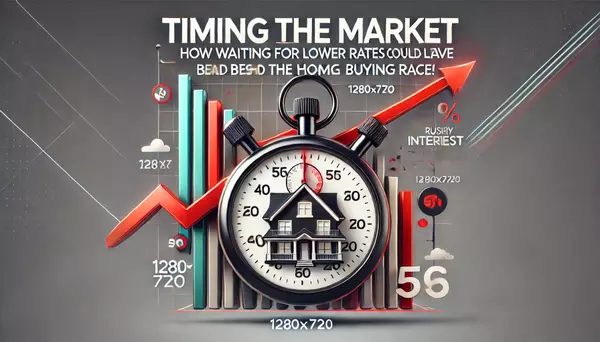Why Everyone is Moving to Texas: The San Antonio Boom
If you've noticed a U-Haul on every corner, it's not just your imagination—Texas is booming, and San Antonio is one of the hottest destinations for people packing up their lives and moving south. But what's driving this mass migration, and what does it mean for the real estate market in San Antonio compared to other major cities? Let's dive into the data and have a little fun along the way.
The Great Texas Migration: Why San Antonio?
Texas has always been a state that prides itself on doing things big, and that includes its appeal to out-of-staters. In 2022 alone, more than 500,000 people moved to Texas from other states, making it one of the top destinations for relocation in the U.S. But within this massive migration, San Antonio is emerging as a particularly popular choice. According to the U.S. Census Bureau, the San Antonio-New Braunfels metro area saw a population increase of over 50,000 people between 2020 and 2023.
So, what’s the big draw?
-
Affordability: San Antonio’s cost of living is about 10% lower than the national average, and housing costs are a significant part of this equation. Compared to Austin, Dallas, or Houston, San Antonio offers more bang for your buck, which is especially appealing for those moving from more expensive states like California or New York.
-
Booming Job Market: San Antonio is not just about the Alamo and River Walk. The city has become a hub for industries like cybersecurity, healthcare, and advanced manufacturing. Moreover, San Antonio is famously business-friendly, offering tax incentives and a welcoming regulatory environment that attracts companies from across the nation.
-
Quality of Life: Who wouldn’t want to enjoy a city where Southern hospitality meets urban convenience? San Antonio boasts a rich cultural scene, great food (hello, Tex-Mex!), and a growing number of outdoor activities. Plus, the city’s warm climate is a big plus for those fleeing colder northern states.
Real Estate Market: How is San Antonio Faring?
With all these people moving in, what’s happening in the real estate market? Well, if you’re a homeowner in San Antonio, it’s likely you’ve seen a nice boost in your property’s value. According to Zillow, the median home price in San Antonio has risen by over 30% in the last five years. As of mid-2024, the median home price stands at approximately $330,000—still far more affordable than Austin’s eye-popping $600,000 median, but rising steadily.
However, this rapid price increase has also made it a bit tougher for first-time homebuyers. The market is competitive, with homes often receiving multiple offers and selling above the asking price. Yet, compared to other Texas cities, San Antonio remains one of the more accessible real estate markets, both for buyers and investors.
How does this compare to other major Texas cities?
-
Austin: Known as the Silicon Hills, Austin’s tech-driven boom has pushed home prices through the roof. While the city has seen some cooling after the pandemic frenzy, its market remains one of the priciest in the state.
-
Houston: The Space City has a more volatile market, with home prices somewhat leveling off due to fluctuations in the oil industry. Still, Houston remains a strong contender, especially for larger homes and investment properties.
-
Dallas-Fort Worth: This metroplex has been a powerhouse of growth, with prices rising quickly. It’s a bit more expensive than San Antonio, but also offers a broader range of job opportunities, particularly in finance and technology.
San Antonio’s market, by contrast, offers a nice balance of affordability and growth potential, making it an attractive option for both homeowners and investors.
A Business-Friendly Environment: Who’s Moving In?
It’s not just individuals moving to San Antonio—businesses are making the jump too. Over the past few years, several major companies have relocated their headquarters or expanded their operations in San Antonio, lured by the city’s pro-business climate.
-
Victory Capital: This investment management firm moved its headquarters from Cleveland to San Antonio in 2019, drawn by the city’s favorable tax environment and growing financial sector.
-
CST Brands: The convenience store giant, which operates under the Corner Store brand, has its headquarters in San Antonio, and its presence has bolstered the local job market.
-
SWBC (Southwest Business Corporation): While not a recent move, SWBC’s expansion in San Antonio has cemented the city’s reputation as a growing financial services hub.
These companies are part of a larger trend of businesses finding a welcoming home in San Antonio. With no state income tax, a lower cost of doing business, and a strategic location in the heart of Texas, it’s no wonder San Antonio is becoming a magnet for corporate relocations.
The Future of San Antonio
So, what does the future hold for San Antonio’s real estate market and its economy? If current trends continue, we can expect more growth, both in population and in property values. As the city continues to attract businesses and new residents, the demand for housing will likely keep prices on an upward trajectory, though still more affordable than Texas’ other major metros.
For now, San Antonio offers a sweet spot—a thriving city with a small-town feel, affordable housing, and a booming job market. It’s no surprise that so many people are making their way to the Alamo City, where the future looks bright and the barbecue is always smoked to perfection. Whether you're looking to buy a home, start a business, or just enjoy a better quality of life, San Antonio is a city that’s ready to welcome you with open arms (and probably a plate of tacos).
So, if you’re considering making the move, you might want to act fast—San Antonio’s secret is definitely out!
Categories
Recent Posts







GET MORE INFORMATION

